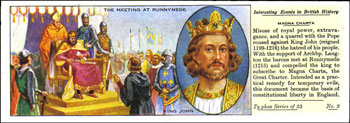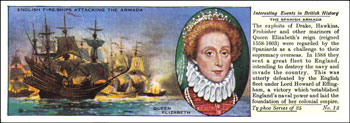Typhoo Tea Interesting Events in British History
Issued in 1938 in the UK, the Interesting Events in British History 25-card set of Typhoo tea cards features important events like wars, catastrophes, exploration, the formation of important bills and treaties and more. The front of each card depicts a drawing of the event featuring a historical person and a description. The back of each card is an advertisement for an Improved Fountain Pen. This set of cards served as a reference guide for historical events and became a collector’s series.

No. 9 – MAGNA CHARTA
Misuse of royal power, extravagance, and a quarrel with the Pope roused against King John (reigned 1199-1216) the hatred of his people. With the support of Archbp. Langton the barons met at Runnymede (1215) and compelled the king to subscribe to Magna Charta, the Great Charter. Intended as a practical remedy for temporary evils, this document became the basis of constitutional liberty in England.
No. 13 – THE SPANISH ARMADA
The exploits of Drake, Hawkins, Frobisher and other mariners of Queen Elizabeth’s rein (reigned 1558-1603) were regarded by the Spaniards as a challenge to their supremacy overseas. In 1588 they sent a great fleet to England, intending to destroy the navy and invade the country. This was utterly defeated by the English fleet under Lord Howard of Effingham, a victory which established England’s naval power and laid the foundation of her colonial empire.


No. 17 – THE WAR OF THE SPANISH SUCCESSION
In 1702 England entered upon what became the first world war. John Churchill, Duke of Marlborough, took command of land operations when Queen Anne ascended the throne (reined 1702-14), and by a series of victories proved himself a military genius; the Battle of Ramillies (1706) was his greatest strategic success. England gained an assured position of world affairs, and a wider commercial outlook.
No. 20 – THE AMERICAN REVOLUTION
Differences in temperament and ideals were more surely the cause of the American Revolution than incidents like the “Boston Tea Party” (1773) when chests of tea were seized by disguised men and thrown overboard as a protest against taxation. The secession of the American Colonies which followed in 1783 was the price of experience in governing the new empire. (George III reigned 1760-1820).
 <
<

No. 24 – MAN MASTERS THE AIR
Aviation has already become a determining factor in the life of the modern world. Serious experimental work was begun in the U.S.A. by the Wright Brothers in 1900. Nine years later a Frenchman, Louis Blériot, flew plane across the Channel from Calais to Dover. While Britain has thus lost much of her island invulnerability, she has gained closer communication with her world-wide empire. (Edward VII reigned 1901-10).
